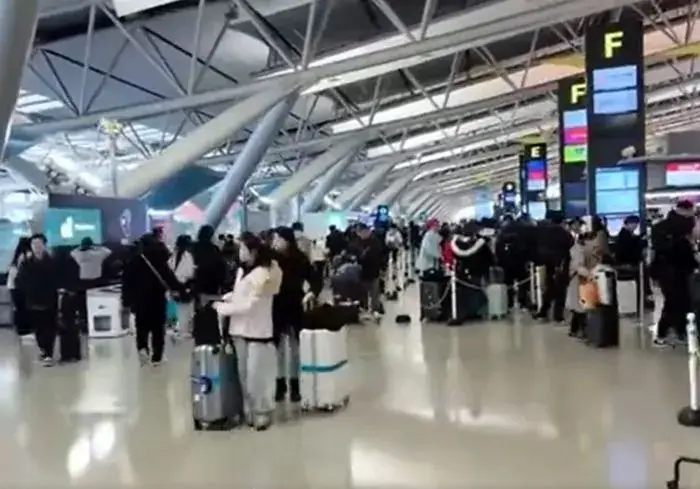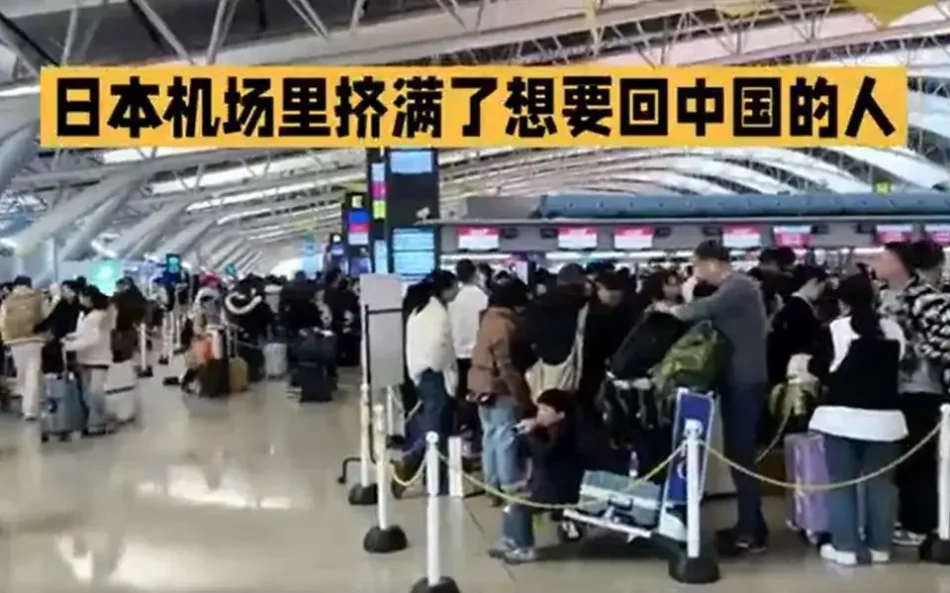A wave of risk-averse travel has swept through Japan’s major airports, creating scenes reminiscent of China’s Spring Festival travel rush as large numbers of Chinese residents and tourists choose to head home. The surge reflects a mix of geopolitical tension, rising safety concerns, economic pressures, and diminishing confidence in daily life in Japan.
The immediate trigger was a sharp rise in perceived security risks. Japanese Prime Minister Sanae Takaichi’s claim that “a Taiwan contingency could constitute a “survival-threatening situation” for Japan was widely viewed in China as crossing a sovereignty red line. Beijing’s prompt security advisory for travel to Japan fueled concerns among Chinese residents and visitors that the political climate could deteriorate further.
At the same time, several incidents intensified mistrust: a security officer at Narita International Airport was arrested for stealing cash from a Chinese traveller, and multiple countries, including the United States, issued their own travel warnings about Japan. These events reinforced the belief among many Chinese nationals that personal safety could no longer be taken for granted.
Economic reality added further pressure. Japan’s cost of living has surged, with electricity prices rising 4.1% year-on-year, food up 3.6%, and essentials like rice reportedly rising as much as 40%. The weakened yen has not delivered the expected consumer windfall; instead, it has pushed up everyday expenses.
Meanwhile, service standards feel increasingly out of step with expectations. Visitors complain about a lack of public trash bins, overcrowded attractions, and inconsistent customer service. When compared with China’s rapid advances in digital payment systems and urban infrastructure, many long-term residents have started to question Japan’s overall value proposition. Airlines, for their part, further accelerated the trend by offering free changes or cancellations on Japan-bound flights, leading to nearly half a million ticket cancellations in just two days.

Long-term residents, businesspeople, and families form the core of the risk-averse group, prioritizing political stability and personal security. Short-term tourists, by contrast, are leaving early because their travel experience fell far short of expectations. At Narita International Airport, check-in and security lines stretched close to two hours, causing many passengers to skip last-minute shopping just to make their flights.
Yet the movement is not one-sided: flights between Shanghai and Tokyo, about 40 per day, remain full, as bargain hunters continue to take advantage of the cheap yen. The result is an unusual coexistence of people fleeing perceived risk and others rushing in for discounts.
Japanese analysts warn that if the decline in Chinese visitors persists for a full year, the tourism industry could lose more than 2 trillion yen, with local economies taking the hardest hit. However, some of the numbers circulating online, such as reports of 30 consecutive months of wage decline or ticket cancellations, have not been officially confirmed by Japan’s Ministry of Health, Labour and Welfare or China’s Civil Aviation Administration. There is also debate about claims that returning travellers are subject to increased scrutiny; such rumours reflect public anxiety about the motivations behind the current exodus.
Compared with seasonal peaks, this wave is driven by sudden political tension rather than predictable holiday patterns. It differs significantly from the 2020 post–Spring Festival return rush or the 2016 peak of homebound travel. Some travellers also face legal considerations: China does not recognize dual nationality, meaning naturalized Japanese citizens must return as foreign nationals and may face stricter entry checks or limitations on residency.
Chinese embassies and consulates have begun coordinating additional temporary flights to meet the surge in demand. For now, officials advise Chinese residents in Japan to stay informed about official safety alerts.








